During the war, Field volunteered to work for Dulles, using his cover as a Unitarian Service Committee relief worker to transmit information back and forth across the Swiss border and to deliver packages of OSS cash to resistance fighters in France. Noel was particularly useful as a conduit to the German Communist underground. The Fields’ foster daughter, Erica, also proved helpful for Dulles, bicycling guns and medicine across the border to France.
It was clear that Noel’s antifascist work had a Communist tilt. In February 1945, he arrived at the OSS office in Paris with Dulles’s written blessing. Field met with young OSS officer Arthur Schlesinger Jr., the future historian and Kennedy White House aide. Field proposed that the OSS subsidize the recruitment of left-wing German refugees in France, who would be dropped inside liberated areas of Germany, where they would begin to establish the country’s new political foundations. Schlesinger, a man of the left, but an ardent anti-Communist, immediately sniffed out Field’s proposal as a scheme to give the Soviet Union a head start in the occupation of Germany.
Schlesinger took a strong disliking to Field. Years later, he would describe him as a “Quaker Communist, filled with idealism, smugness and sacrifice.” Or, as another observer put it, Field exuded “the arrogance of humility.” In Schlesinger’s estimation, he was less of a dangerous figure than a pathetic one. His pious dedication to the Soviet cause “did little damage to the interests of the United States.” Nonetheless, after their Paris meeting, Schlesinger strongly advised his OSS superiors against buying into Field’s scheme for postwar Germany.
Dulles ended up funding Field’s project anyway, which later resulted in much ridicule from his counterparts in British intelligence. Some observers have suggested that this is why, later on, Dulles was able to betray Field with such ease, spreading the lie that he was a secret agent working behind the Iron Curtain for the Americans. But when Dulles decided to feed Noel Field to Stalin—and then, one at a time, three of his family members—there was probably very little spleen involved, just cold calculation.
After Noel dropped out of sight in Prague, his family implored Dulles to help. He had been a guest in the family’s Zurich home. Both Field and his father had put themselves at his service. But Dulles did nothing to rescue Field. And he did nothing to prevent Noel’s family members from walking headlong into the same trap.
Three months into his long ordeal as a captive of Poland’s Stalinist regime, Noel’s brother Hermann was taken from hiscell for another round of grilling. This time Hermann’s interrogator was someone like himself—a tweedy, academic type in his forties. He seemed eager to help Hermann out of his predicament, if only he would fully cooperate. There was no use in playing games any longer: Polish security knew that he and his brother were part of a conspiracy against the peace-loving peoples of the Communist world.
Hermann, a political innocent whose ideology amounted to nothing more than a kind of do-gooder Quakerism, was utterly confused. He had no clue about why he, or his brother, had fallen into this Kafkaesque nightmare. “But you’re not talking sense,” he told his inquisitor. “What conspiracy? Tell me what I have done to you. Give me just one example.”
The tweedy man began pacing back and forth in front of the stool where Hermann sat. Suddenly he stopped and blurted out, “Who is Allen Dulles? Mr. Field, tell me precisely, what were your contacts with Allen Dulles, and what was the nature of your assignments from him?”
Hermann’s interrogator clearly thought that by abruptly invoking Dulles’s name, Field would finally crumble. But the question only served to deepen Hermann’s confusion. Field had been too young to remember meeting Dulles as a child in Zurich. He had only a vague memory of the name.
“There’s a John Foster Dulles,” Hermann tried helpfully. “That’s the only one I’m sure of. He’s some sort of adviser on foreign affairs to the Republican Party.”
But the interrogator would have none of this evasion. He kept on badgering Hermann, hour after hour. “I felt like I was in an insane asylum,” Field later recalled.
In fact, the mysterious Allen Dulles was at the center of Hermann Field’s ordeal. Field just didn’t realize it.
Operation Splinter Factor succeededbeyond the OPC’s wildest dreams. Stalin became convinced that the Fields were at the center of a wide-ranging operation to infiltrate anti-Soviet elements into leadership positions throughout the Eastern bloc. The Dulles-Wisner plot aggravated the Soviet premier’s already rampant paranoia, resulting in an epic reign of terror that, before it finally ran its course, would destroy the lives of untold numbers of people. Hundreds of thousands throughout Eastern Europe were arrested; many were tortured and executed. In Czechoslovakia, where nearly 170,000 Communist Party members were seized as suspects in the make-believe Field plot, the political crisis grew so severe that the economy nearly collapsed.
Anyone whose life had been even remotely touched by Noel Field during his war relief work was subject to the sweeping purge. Many of the officials rounded up had been war heroes in their countries—antifascist fighters who survived the Nazi occupation only to be falsely accused as traitors by Stalin’s secret police. Most victims were independent-minded nationalists, the sort of leaders who put their own people’s interests ahead of blind obedience to Moscow. Jewish officials, whose “cosmopolitan” and “Zionist” sensibilities aroused suspicion, also bore the brunt of Stalin’s crackdown.
Back in Washington, Wisner exulted over each wave of arrests and each new round of show trials, where the accused were made to publicly condemn themselves before they were executed. “ The comrades are merrily sticking knivesin each others’ backs and doing our dirty work for us,” Wisner gleefully reported.
The Office of Policy Coordination men knew that many of the Splinter Factor victims were patriots who were beloved by their own people. But, in the eyes of Dulles, this actually made them more dangerous. As one political observer of Splinter Factor remarked, “ Dulles wished to leave Eastern Europe devoid of hopeso that he could introduce a pro-American, anti-Soviet form of government … Nationalist Communists were making communism acceptable to the people, and so, accordingly, they had to be removed.”
As a result of the rapidly spreading inquisition, political dialogue in Eastern Europe was frozen, the screws of thought control were tightened, and cultural exchange and trade with the West were shut down. But Dulles saw all this as a positive development. Like the most rigid of Marxists, he believed that by increasing the suffering of Eastern Europe’s enslaved populations, they would be pushed beyond their breaking point and forced to revolt against their Soviet masters. But, as was the case with the Communist true believers who advocated “heightening the contradictions” in order to bring about the glorious revolution, Operation Splinter Factor brought only more misery to the people of the Soviet bloc. Dulles would not live long enough to see their day of liberation.
Erica Wallach was freed from her arctic gulag in 1954, after Stalin died and the “Field conspiracy” was finally exposed behind the Iron Curtain for what it was—a devilishly clever Allen Dulles brainstorm. She was released into the custody of Soviet secret police officials, who apologized and offered her money, and then took her to East Berlin, where they put her in a taxi to the West. She walked to freedom through the Brandenburg Gate, exactly where she had started her harrowing journey five years and two months earlier.
Читать дальше











